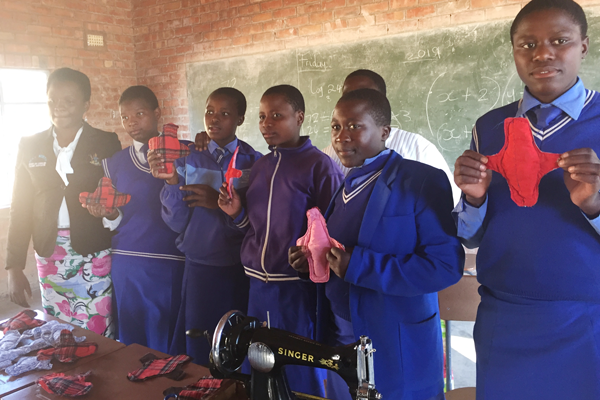

BY SHARON SIBINDI
For Melody Nkomo, life became very difficult for her each time she was on her monthly periods.
Nkomo (18), a student at Mahlothova High School in Matabeleland North’s Umguza district, would stop going to school because she feared the linen she used as pads would leak, embarrassing her in front of peers.
“I would cut dirty linen, wash it, dry it directly in the sunlight, and then use the iron to kill germs, fold it into a pad and then use it,” she said.
Nkomo says her life was transformed when she was recruited into a programme by the National Aids Council (NAC), where young girls are given training on sexual reproductive health.
Under the Sista2Sista programme, the girls are also taught how to make reusable pads.
Nkomo said besides being able to attend school throughout the month, she can now participate in her favourite sports activities such as netball and athletics. The reusable pads, which Nkomo is now able to make, have improved her confidence.
“I do netball, jumps and track events and not having proper pads used to affect me a lot, but now the reusable pads have helped me as they do not move at all,” she said.
- Chamisa under fire over US$120K donation
- Mavhunga puts DeMbare into Chibuku quarterfinals
- Pension funds bet on Cabora Bassa oilfields
- Councils defy govt fire tender directive
Keep Reading
‘They make me feel comfortable and also in the class, it no longer affects my attendance.”
Nkomo has also been able to teach her schoolmates how to make the pads and has teamed up with four other girls to make pads they give to other girls.
The girls use hand sewing machines to make the pads, using fleece material and brushed cotton.
“We use the sewing machine from the school’s fashion and fabrics department to make the reusable pads,” Nkomo said.
“We wish to make more pads, but getting the material is a challenge as the number of girls in need of the pads keeps going up.”
Matabeleland North provincial guidance and counselling teachers’ chairperson Gabriella Chikara said the majority of parents in Umguza are too poor to afford sanitary pads for their children.
“We receive donations from Camfed, Plan International and the National Aids Council, but they are not sufficient because some learners have heavy flows such that they use more than one pack per cycle,” she said.
Chikara said the schoolgirls end up sharing the donated pads with their older relatives, who cannot afford to buy their own.
“Some learners are not covered by these organisations, so they miss school during their menses and some report that they fail to come to school in fear of spoiling their clothes,” she said.
“They choose to stay at home, dig a hole and sit on it without underwear so that the blood goes into the ground every day until the menstruation days are over.”
Others resort to using unhygienic materials such as tree leaves, newspapers and old rags.
Prominent gynaecologist Solwayo Ngwenya said it was dangerous to use the materials in the long run.
“Unwise and undesirable to use tree leaves, paper and cloth as a substitute for menstrual pads,” he said.
“These may have some substances, which are not known and be absorbed in the valves that may cause problems later on in life.”
Ngwenya said there was also a risk that the girls might suffer from infertility.
Chikara said Nkomo has emerged as a champion for girls in the district struggling to access affordable pads.
The province is organising a workshop where the girl will share her story with her peers to encourage them to follow in her footsteps.
Nkomo has had a tough upbringing after being forced to be head of the family at an early age after her parents deserted them.
“My father went to look for a job when I was in Grade 5 and has never returned, while my mother went to my grandmother’s funeral in Tsholotsho last year, came back for a while before going back, and disappearing for good,” Nkomo said.
Her elder brother works in Hope Fountain and at times sends money to help Nkomo and her two young siblings.
“We get our source of food through farming and my brother helps us at times,” she said.
“We also do part-time jobs at neighbouring farms and from the money we are paid, we buy relish and school uniforms. Plan International pays my school fees.”
Nkomo also plays mother to her younger sister whom she teaches about reproductive health. She has also taught her to make the reusable pads.
Chikara said they hoped to raise funds to assist Nkomo and her siblings with good education and buy her a bicycle.
“We understand hers is a touching story, but we want her to tell it to the whole world through these training programmes,” she said.
“She will be empowering other girls by training them to make the pads while also selling her story.”
Nkomo travels 15km to and from school every day, but is still one of the best performing students at Mahlothova.
“Being a breadwinner and having no source of lighting to use in the evening at home and taking care of her siblings, she can’t perform any miracle,” Chikara said.
“She is a hard worker, but the playing ground is not level. As someone I taught for three years, I believe, all other things being constant, she can do well.”
Thabani Mpofu, a consultant for Gender Links, urged the government to invest in the manufacture of cheaper sanitary wear for girls to improve their quality of life.
“Some issues are not discussed and we see girls missing school,” she said. “This may result in them performing badly at school and that also has got long-term effects.”










